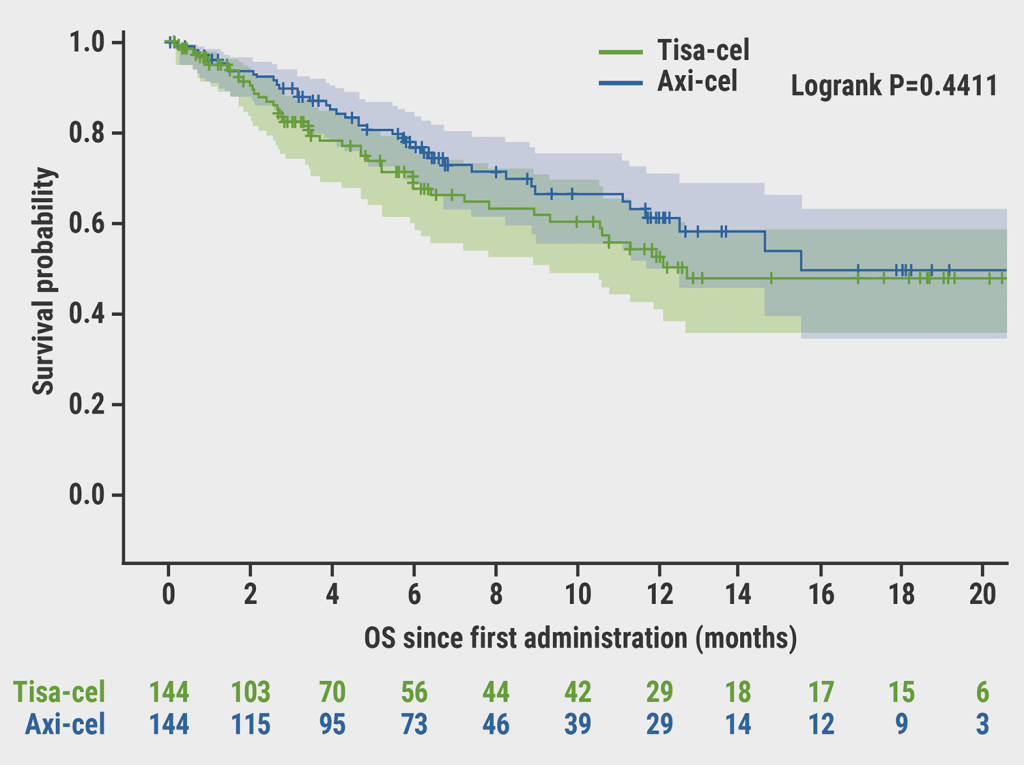The revised regimen substituted polatuzumab for vincristine in 440 volunteers with previously untreated intermediate-risk or high-risk disease.
After a median follow-up of 28.2 months, 76.7% had survived without disease progression at two years compared with 70.2% of the 439 randomly assigned to receive standard R-CHOP therapy (P=0.02), researchers report in the New England Journal of Medicine.
"We've had 20 years of not seeing a positive trial in this setting, so this offers a lot of hope," senior author Dr. Gilles Salles of the Memorial Sloan Kettering Cancer Center in New York told Reuters Health by phone. "What was very reassuring is that there were no differences in toxicity, so you're bringing some improvement in controlling the disease without substantial toxicity, and that's good news for the patient."
The modified treatment did not significantly improve overall survival at two years. The rates were 88.7% when polatuzumab vedotin was part of the regimen versus 88.6% with conventional R-CHOP (P=0.75).
But that's not surprising because evidence of improved survival often comes later, said Dr. Salles, chief of the lymphoma service at Memorial. "I think we have to wait two to three years to see how it translates."
Roche funded the study, the results of which were also presented at the American Society of Hematology's annual meeting.
R-CHOP - first-line therapy consisting of rituximab, cyclophosphamide, doxorubicin, vincristine and prednisone - typically fails at some point in up to 40% of patients.
In an earlier phase 1b-2 study, the polatuzumab vedotin combination produced an overall response of 89% and a complete response in 77%.
POLARIX was a phase-3 examination of the effectiveness of the newer therapy, dubbed pola-R-CHP. It was given over eight 21-day cycles. Median time to treatment was about 27 days. The study used the combination as first-line therapy.
When the team did a subgroup analysis of the results, they found that pola-R-CHP did not show a clear benefit among patients younger than 61, women, patients who had bulky disease, those who had a lower International Prognostic Index (IPI) score and those with the germinal-center B-cell-like subtype of diffuse large beta-cell lymphoma.
Because those were not primary end points, "We have to interpret that with a grain of salt," said Dr. Salles.
The rates of subsequent therapy for lymphoma not specified in the protocols were 22.5% with pola-R-CHP versus 30.3% with R-CHOP. Stem cell transplantation was done in 3.9% and 7.1% of patients, respectively.
Dr. Salles said current improvements in salvage therapy for patients may have made a difference in overall survival with pola-R-CHP harder to see at this stage.
Side effects for the two therapies were similar. The rates of serious adverse events were 34.0% with pola-R-CHP and 30.6% with R-CHOP.
The rates of dose reduction were 9.2% and 13.0%, respectively.
Twenty-three patients (2.6%) died as a result of their treatment, 13 of whom were in the pola-R-CHP group. Pneumonia killed seven of the 23. Sepsis killed four. There was no clear pattern by treatment.
In June of 2019 the U.S. Food and Drug Administration granted accelerated approval to the treatment for patients with diffuse large B-cell lymphoma, the most common form of lymphoma. It was to be used when at least two other therapies had failed.
SOURCE: https://bit.ly/3oSBweN The New England Journal of Medicine, online December 14, 2021.
By Gene Emery
Posted on
Previous Article
« Tumor biology more important than race in predicting treatment response in breast cancer Next Article
CAR-T cell therapy for multiple myeloma may lead to Parkinson’s-like symptoms »
« Tumor biology more important than race in predicting treatment response in breast cancer Next Article
CAR-T cell therapy for multiple myeloma may lead to Parkinson’s-like symptoms »
Related Articles

February 4, 2022
Axi-cel more effective but tisa-cel less toxic in DLBCL
© 2024 Medicom Medical Publishers. All rights reserved. Terms and Conditions | Privacy Policy
HEAD OFFICE
Laarderhoogtweg 25
1101 EB Amsterdam
The Netherlands
T: +31 85 4012 560
E: publishers@medicom-publishers.com

